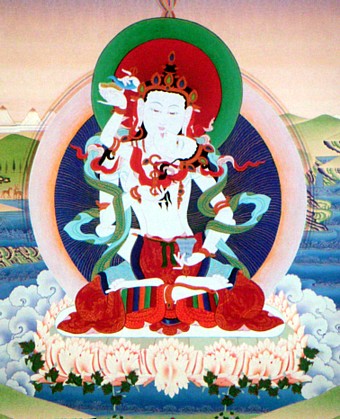Sambhogakaya: Difference between revisions
Jump to navigation
Jump to search
mNo edit summary |
mNo edit summary |
||
| (14 intermediate revisions by 3 users not shown) | |||
| Line 1: | Line 1: | ||
'''Sambhogakaya''' (Tib. ''longku'' | [[Image:VajrasattvaLarger.jpg|frame|[[Vajrasattva]] adorned with the [[thirteen ornaments of the perfect sambhogakaya]]]] | ||
'''Sambhogakaya''' (Skt. ''saṃbhogakāya''; Tib. [[ལོངས་སྐུ་]], ''longku'', [[Wyl.]] ''longs sku'') is defined as a 'form [[kaya|body]]' ([[rupakaya]]) of a [[buddha]], which appears only to [[bodhisattva]]s and is the basis for the arising of the [[nirmanakaya]]. It is adorned with the [[major signs and minor marks]]. | |||
[[Sogyal Rinpoche]] writes: | |||
:Sambhogakaya is the dimension of complete enjoyment, the field of total plenitude, beyond dualistic limitations and beyond space and time.<ref>''[[The Tibetan Book of Living and Dying]]'' revised and updated edition (HarperSanFrancisco and London: Rider, 2002), page 347.</ref> | |||
==Alternative Translations== | |||
*Buddha Body of Perfect Resource (Dorje & Coleman) | |||
==Notes== | |||
<small><references/></small> | |||
==Further Reading== | |||
*[[Thinley Norbu]], ''The Small Golden Key'' (Shambhala Publications, 1999), ‘15. Saṃbhogakāya’. | |||
==Internal Links== | |||
*[[five certainties]] | |||
*[[seven aspects of union]] | |||
*[[thirteen ornaments of the perfect sambhogakaya]] | |||
[[Category:Key Terms]] | [[Category:Key Terms]] | ||
[[Category:Kayas]] | |||
Latest revision as of 22:19, 15 February 2021

Sambhogakaya (Skt. saṃbhogakāya; Tib. ལོངས་སྐུ་, longku, Wyl. longs sku) is defined as a 'form body' (rupakaya) of a buddha, which appears only to bodhisattvas and is the basis for the arising of the nirmanakaya. It is adorned with the major signs and minor marks.
Sogyal Rinpoche writes:
- Sambhogakaya is the dimension of complete enjoyment, the field of total plenitude, beyond dualistic limitations and beyond space and time.[1]
Alternative Translations
- Buddha Body of Perfect Resource (Dorje & Coleman)
Notes
- ↑ The Tibetan Book of Living and Dying revised and updated edition (HarperSanFrancisco and London: Rider, 2002), page 347.
Further Reading
- Thinley Norbu, The Small Golden Key (Shambhala Publications, 1999), ‘15. Saṃbhogakāya’.